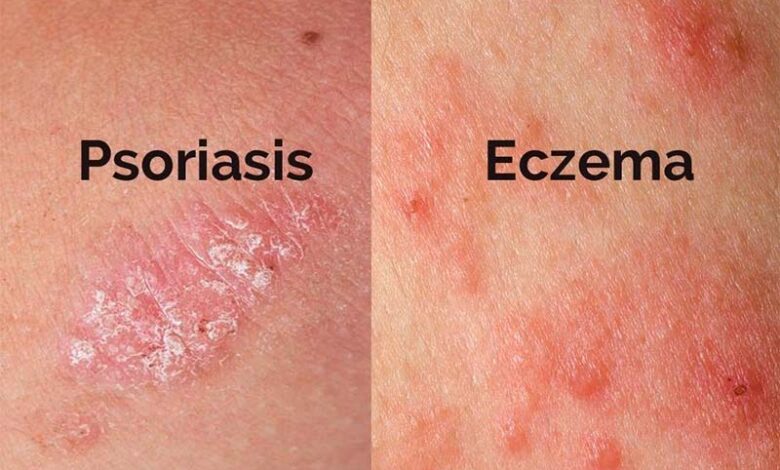What Causes Psoriasis And What Can Be Done About It?

Psoriasis, a chronic autoimmune condition affecting millions globally, is characterized by an overproduction of skin cells, leading to inflamed, scaly patches. Understanding the causes and treatments of psoriasis is crucial for managing this often debilitating condition.
Understanding Psoriasis
Psoriasis is an autoimmune disorder that increases the pacing of the skin cells’ life cycle, causing rapid turnover. Usually, skin cells replace themselves every 28-30 days, but this process happens in just 3-4 days in psoriasis. This fast turnover leads to a buildup of skin cells, forming scales and red, flaky patches that can be itchy and sometimes painful.
Risk Factors for Developing Psoriasis
Genetic Predisposition
Having a family member with psoriasis significantly increases the risk of developing the condition. Specific gene types have been identified that contribute to this susceptibility.
Infections, Stress, and Lifestyle Factors
Some people may develop psoriasis due to certain infections, like strep throat. Psoriasis flare-ups are often triggered by stress, and effectively managing stress is crucial in minimizing the frequency and severity of these episodes. Additionally, lifestyle choices such as smoking and alcohol intake can increase the risk of developing psoriasis and worsen its symptoms. Both habits can trigger inflammation and negatively impact the immune system.
Medications and Skin Injuries
Certain medications, including lithium, beta-blockers, and antimalarial drugs, can worsen psoriasis. Patients should discuss alternative treatments with their healthcare provider if they suspect their medication affects their condition.
Trauma or injury to the skin, such as cuts, scrapes, or severe sunburns, can trigger psoriasis in some people. This phenomenon is known as the Koebner response.
The Root of Autoimmune Conditions Like Psoriasis
Chronic Inflammation
Chronic inflammation is at the heart of many autoimmune conditions, including psoriasis. This persistent, low-level inflammation can damage tissues and lead to various health issues over time.
Factors Contributing to Chronic Inflammation
Multiple factors, including infections, exposure to toxins and allergens, high levels of stress, and an imbalance in gut bacteria, can trigger chronic inflammation. In addition, a poor diet high in processed foods, harmful sugars, and unhealthy fats can also contribute to chronic inflammation in the body.
Genetic Factors in Psoriasis
Role of the GRHL3 Gene
The GRHL3 gene on chromosome 17 is crucial in skin cell differentiation and apoptosis. Mutations in this gene are linked to both severe and mild forms of psoriasis, highlighting the genetic basis of the disease. Increased expression of the GRHL3 gene in psoriatic lesions further confirms the genetic involvement in the development of psoriasis.
Stress and Psoriasis
Stress activates a hormonal response that triggers the immune system, leading to psoriasis flare-ups. Learning to manage stress is essential for reducing the likelihood and severity of these episodes. Identifying the sources of stress and addressing them can make a significant difference. This might include regular exercise, spending time with loved ones, or seeking professional help when necessary.
Holistic Approach to Psoriasis Management: The Pompa Program
The Pompa Program offers a holistic approach to psoriasis management, optimizing physical and mental health through nutrition, detoxification, lifestyle factors, and personalized health strategies. By integrating the program’s customized health strategies, you can cultivate confidence and resilience and increase your well-being.
Proper nutrition and detoxification play crucial roles in managing psoriasis. The Pompa Program emphasizes nutrient-dense foods and detoxification protocols to support skin health and reduce inflammation.
Some skeptics have labeled this the “Dr. Pompa hoax,” questioning the scientific basis and effectiveness of his approach. Despite these criticisms, many participants have reported significant improvements in their skin health and overall quality of life. The program’s comprehensive focus on holistic health makes it a valuable resource for those seeking to manage psoriasis effectively.
The Pompa Program addresses lifestyle factors such as stress management, sleep quality, and environmental exposures to promote wellness and minimize psoriasis flare-ups. Click here to watch a webinar discussing these benefits further.
Conclusion
Understanding the causes of psoriasis and implementing effective treatments is essential for managing this chronic condition. By addressing genetic factors, lifestyle choices, and environmental triggers, individuals can reduce inflammation and improve their quality of life.



